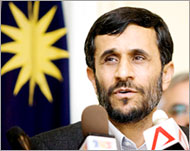IAEA refers Iran to Security Council
The UN nuclear watchdog has decided to refer Iran to the Security Council for possible punitive action and the US says the council is likely to demand Iran halt nuclear research or risk consequences.

The US statement, obtained by Reuters from a Western diplomat, said on Wednesday that the “time has now come for the council to act” as Iran had defied an International Atomic Energy Agency (IAEA) board resolution last month to suspend all nuclear fuel enrichment activity.
The US says the council will debate Iran’s “flagrant threats and phoney negotiations” early next week.
Iran responded by saying the US could feel “harm and pain” if the Security Council took up the issue of Tehran’s nuclear research.
“The US may have the power to cause harm and pain, but it is also susceptible to harm and pain. So if the US wishes to choose that path, let the ball roll,” it said on Wednesday in a statement obtained by Reuters on the sidelines of a UN nuclear watchdog board meeting in Vienna.
Russia: Sanctions ineffective
The Security Council may take punitive action such as imposing sanctions, but it is not clear all permanent members would back such moves.
Russia said on Wednesday that imposing sanctions on Iran would be ineffective in convincing Tehran to curb its nuclear ambitions.
Sergei Lavrov, the Russian foreign minister, also told reporters after meeting Kofi Annan, the UN secretary-general, that he opposed military action and questioned any measures the West might propose in the Council.
Several hours after he spoke, the five permanent members of the Security Council met to discuss a statement that Britain, France and the United States are preparing for possible adoption next week.
The statement was to have asked for a report from the IAEA in 30 days on whether Iran had co-operated with the watchdog and suspended its atomic activities, diplomats said.
But one envoy, speaking on condition of anonymity, said Britain now wanted a 14-day deadline while no immediate decision had been reached among the five – the United States, Russia, China, Britain and France.
Lavrov made clear that he wanted the IAEA rather than the Security Council to take the lead on the Iranian issue.
“We should all strive for a solution which would not endanger the ability of the IAEA to continue its work in Iran, while of course making sure that there is no danger for the non-proliferation regime,” he said.
Asked about sanctions, Lavrov said: “I don’t think sanctions as a means to solve a crisis have ever achieved a goal in the recent history.”
He added later: “We are convinced that there is no military solution to this crisis.”
Earlier, Europe and the US increased the pressure on Iran to back down over its nuclear ambitions as the UN’s atomic watchdog studied a key report to be sent to the Security Council.
The report, drawn up by Mohamed ElBaradei, the IAEA chief, says Iran has resumed uranium enrichment activities in defiance of demands by the international community to halt work.
The report said Tehran had failed fully to co-operate with the IAEA, but stopped short of indicating whether ElBaradei thought it was pursuing a secret programme to make nuclear weapons.
Outstanding questions
Diplomats in Vienna said the discussion by the IAEA board of governors on Iran’s programme was set to be brief as the dossier was transferred automatically to the Security Council for action.
 |
|
Ahmadinejad: The West will |
A diplomat in Vienna told AFP on Wednesday that the US had alleged that Iran had enough uranium gas to make 10 nuclear weapons and had called for new inspections in the Islamic republic.
A senior US official made the claim at a closed-door meeting of the IAEA in Vienna, the diplomat said.
Gregory Schulte, the US ambassador, told the IAEA’s 35-nation board of governors that Iran had failed on every count to meet the watchdog’s call for it to suspend uranium enrichment.
Uranium is enriched so it can be used as fuel in a nuclear power reactor or, if enriched further, to make an atomic weapon.
Ten bombs
Schlulte said Iran had 85 tonnes of the uranium hexafluoride (UF6) gas and said this was enough to make 10 atom bombs, the diplomat reported.
In Iran, Mahmoud Ahmadinejad, the president, said the West would regret choosing to step up pressure on the Islamic republic.
|
“[Security Council members] can meet as three, then as five and then as 15, but that will not change anything” Mahmoud Ahmadinejad, |
The president said Tehran would not give in to demands that it should limit its nuclear drive.
“If anyone wants to violate the rights of the Iranian nation, they will quickly regret their actions,” he said in a speech to thousands of supporters in the western province of Lorestan.
“Iran will not give in to political pressure and blackmail. They can meet as three, then as five and then as 15, but that will not change anything,” he said, referring to the progressive shifting of the crisis to the Security Council.